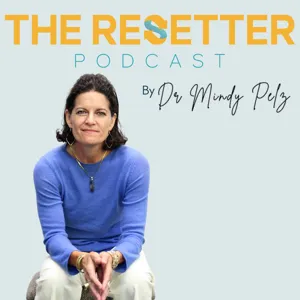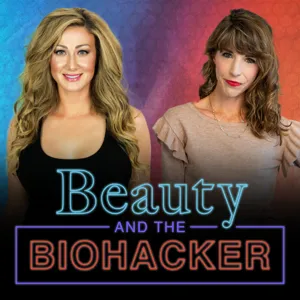Podcast Summary
Understanding individual circadian rhythms for optimal sleep: Getting enough quality sleep at the right time, influenced by our circadian rhythms, is essential for overall health and wellness. AG1 supplements can support various health functions.
Getting enough quality sleep is crucial for our overall health, and the timing of our sleep is important due to our circadian rhythms. These rhythms, controlled by the suprachiasmatic nucleus in the brain, regulate various processes in our bodies. Lack of sleep can negatively impact these processes. Dr. Roger Schwelt emphasized the importance of understanding our individual circadian rhythms for optimal sleep. AG1 supplements, rich in vitamins, minerals, probiotics, and more, can support overall health and wellness, including energy, focus, gut health, and immune system function. For a special offer on AG1 supplements, visit drinkagone.com/livemore.
Impact of Missed Sleep on Important Proteins: One night of missed sleep disrupts crucial proteins for glucose regulation and immune response, potentially leading to health issues due to altered light exposure and circadian rhythm disruption.
Disrupting our natural circadian rhythm, specifically by pulling an all-nighter, can have significant impacts on various important proteins in our body. These proteins play crucial roles in functions such as glucose regulation and immune response. The study showed that just one night of missed sleep led to these proteins being produced out of sync. Furthermore, the most common disruptor of our circadian rhythm is the excessive exposure to artificial light from sources like electricity bulbs and media screens. This modern-day issue has significantly altered the way our bodies receive light, leading to potential health consequences.
Artificial light disrupts natural sleep rhythm: Limiting exposure to artificial light before bedtime and establishing a consistent sleep schedule can improve sleep quality
Excessive exposure to artificial light at night can disrupt our natural circadian rhythm, making it harder for us to fall asleep on time. This issue is more prevalent in today's society due to the ease of access to artificial light sources, such as electric bulbs and screens. As a result, many people experience delayed sleep onset and reduced sleep duration, which can negatively impact their overall health. The recommended sleep duration for adults is 7-8 hours, but due to cultural demands and disrupted circadian rhythms, many individuals struggle to meet this requirement. To improve sleep quality, consider limiting exposure to artificial light before bedtime and establishing a consistent sleep schedule.
Managing Light Exposure for Better Sleep: Shift your circadian rhythm by getting more natural light during the day and avoiding bright lights before bedtime to improve sleep quality, enhance mood, and boost overall health.
Getting the recommended amount of sleep each night is crucial for our health, but for those who struggle to meet this requirement due to work schedules, there are ways to help adjust their circadian rhythm. This can be achieved through managing light exposure. Most people have trouble falling asleep too late due to excessive evening light and insufficient morning light. To help patients shift their rhythm, simple suggestions include getting more natural light during the day and avoiding screens or bright lights before bedtime. Light plays a significant role in both regulating our circadian rhythm and impacting our overall well-being. By making conscious choices about our light exposure, we can improve our sleep quality and, in turn, enhance our mood and overall health.
Maximizing natural light during the day and minimizing artificial light at night for better sleep: Exposure to natural light during the day and avoiding artificial light at night can help regulate your circadian rhythm, leading to improved sleep quality and increased energy levels.
Exposure to natural light during the day and avoiding artificial light at night can help regulate your circadian rhythm, influencing your sleep patterns. During the day, bright light signals to your brain that it's time to be awake and productive. In contrast, nighttime exposure to artificial light can delay your circadian rhythm, making it harder to fall asleep and get a good night's rest. To optimize your sleep, aim to get plenty of natural light during the day and minimize artificial light at night. This means opening curtains and turning on bright lights in the morning, and using dimmers or turning off lights altogether in the evening. By following this simple routine, you can improve your sleep quality, feel more energized during the day, and maintain a healthy circadian rhythm.
Morning routine affects sleep quality: A consistent morning routine and maintaining a dark, quiet environment before bed can promote optimal sleep quality, while a disrupted morning routine can shift your circadian rhythm and lead to poor sleep
The quality of your sleep is influenced not only by your pre-bedtime routine, but also by what you do first thing in the morning. A disrupted morning routine can shift your circadian rhythm, making it harder to fall asleep at a reasonable hour and leading to poor sleep quality. For example, someone under societal pressure to work long hours might leave the lights on while working late into the night, which can push their circadian rhythm later. This person may then try to compensate by going to bed earlier, but due to their shifted rhythm, they may have trouble falling asleep. This can create a self-fulfilling prophecy of poor sleep, leading to increased anxiety and further disrupting their sleep. Therefore, it's essential to prioritize a consistent morning routine and maintain a dark, quiet environment in the hours leading up to bedtime to promote optimal sleep quality.
Maintaining good sleep and productivity: Consistent schedule, reduce anxiety, and utilize light therapy: Consistently schedule sleep, manage anxiety, and apply light therapy to optimize sleep patterns and overall well-being. Subscribe to my Friday Five email for weekly positivity and sleep tips at DrChasci.com/Friday5.
Proper sleep hygiene and managing societal pressures are crucial for maintaining good sleep and productivity. As a sleep physician, I recommend establishing a consistent sleep schedule, reducing anxiety, and utilizing light therapy to adjust the circadian rhythm. By making conscious efforts to counteract societal pressures, we can preserve optimal sleep patterns and overall well-being. Additionally, consider signing up for my Friday Five email newsletter, where I share positive and inspiring content, including articles, quotes, and exciting research findings. This weekly dose of positivity is designed to help you kickstart your weekend on a high note. To subscribe, visit DrChasci.com/Friday5. Remember, taking care of your sleep is essential for achieving high productivity and overall health. Don't hesitate to explore the full conversation with my guests for more insights on this topic. Stay tuned for my long-form conversational Wednesday episodes and the latest Bite Science release next Friday. Have a fantastic weekend!



